In the world of Assassin’s Creed, the assassin’s robes are often inherited, handed down from generation to generation. The games work in this fashion too, as each entry learns from its past, often building off the mechanics of its predecessors in increasingly grandiose and ambitious ways. This is a series invested in its own history as much as it’s interested in actual history.
Assassin’s Creed Unity, the seventh major entry in the series, was poised to be the latest progeny in the franchise family, and, indeed, it has big shoes to fill. Not only is it the series’ first exclusive entry on the next-gen consoles, but it’s also the follow-up to the ambitious and much-praised Black Flag. Despite being poised for success, Unity seems to have forgotten much of what it’s learned from its predecessors.
Unity follows the life of Arno Dorian, the orphaned son of an assassin. Equal parts revenge story and conspiracy tale, this game takes a more liberal approach to the age-old Templar and Assassin conflict. The two factions are still at odds with one another, both in the past and in the present, but a betrayal makes allies of Arno and his Templar love-interest Élise de la Serre. While Arno indulges himself in a redemptive quest with the Assassin Brotherhood, Élise is out for a more utilitarian purposes: revenge. This often causes clash in interests, though their allegiances never complicate things as much as you’d expect.
This tale of intrigue and betrayal unfolds during the French Revolution—a setting that has been consistently teased by earlier Assassin’s Creed games. Though a few major story missions unfold around Madame Guillotine, the French Revolution takes a backseat to the story itself. Yes, the Templars do tug the strings behind the scenes of the Revolution, but these manipulations primarily punctuate the betrayal and conflict unfolding within their own ranks. Most of the historically rich content is tucked away in side and co-op missions. Here, you can catch a glimpse of Marie Antoinette, deliver severed heads to Madame Tussaud, or assist the Marquis de Sade in delightful debauchery. Napolean Bonaparte’s love life is even subject to Arno’s involvement (to much comedic effect).
Despite these touches, I was never quite swept away by Unity’s historically rich setting. If anything, I felt that the French Revolution was primarily metamorphosed into a game mechanic. I gave little thought to the plight of the rioting crowds, but I was eager to use them as cover for a stealthy escape. The construction of barricades provided cover or made scaling large buildings easier.
Beyond that, Ubisoft continues to have its protagonist manipulate history with all the glee and vigor of self-insert historical fanfiction. The story itself heavily borrows narrative beats from other entries, but it takes no surprising steps of its own. Therein, perhaps, lies the crux of Unity’s flaws: it is too complacent in what it borrows from its predecessors, and far, far, too greedy with how it diverges from the franchise’s well-trodden path. While the series may never run out of historical playgrounds, it almost feels like it’s exhausted itself narratively and mechanically. Almost.
There are a host of new features that made my playthrough a generally pleasant experience, and it’s these thoughtful innovations that give me hope for the franchise’s future. The most prominent of these innovations is the gear customization and levelling system. There’s a wealth of equipment, weapons, and skills to choose from that make Arno as lethal as possible. Hoods, robes, pants, and belts each come with distinct aesthetic style and stats. The military set, for example, prioritizes ammunition storage and is ideal for assassins with a gun-slinging predilection. Other sets give substantial boosts to health, melee attacks, or stealth, allowing Arno’s clothing style to aid various play-styles.
Similarly, successfully maximizing the synchronization for each memory (read: completing the challenges for each mission) grants points which can be used to purchase skills. These range from the ever-useful Disguise (which allows you to briefly adopt the appearance of a targeted enemy) to Communal Sense (which shares Eagle Vision with allies in co-op). A few of the purchasable skills—such as double assassination and aerial double-assassination—felt arbitrarily fractured off from Arno’s basic abilities, but, for the most part, the skills allow players to focus on and upgrade what they most frequently use in-game.
Fittingly, the combat and stealth mechanics were reconfigured to compliment these customization options…or so they say. Unity borrows freely from previous Assassin’s Creed games without contributing anything terribly new to the formula. The kill-chain option has been completely removed, and the enemies’ guns actually pack a punch. Prolonged enemy encounters shift the focus back to performing “perfect parries” (indicated by a gold flash of enemies’ health bars) in order to deflect incoming attacks and dole out bonus damage. Suffice to say, the combat system doesn’t innovate so much as it refines.
This results in a game that rewards technical skill and strategy over brute force. Each major assassination is preceded by a cutscene which highlights environmental and architectural features that give you a tactical advantage, be they causing a distraction or trapping smoke in a sewer system to provide cover. Unity also capitalizes on your last known location by leaving a silhouette of Arno where he broke the line of sight, allowing you to strategically leave cover to lure guards away from their post. At times, I actually felt like a Master Assassin, sweeping unseen through the shadows and manipulating my environment to ensnare my target. Most of the time, I ended up scolding Arno like a bad dog for unexpectedly leaving cover or refusing to enter it altogether. All I needed was a rolled-up newspaper.
Of course, no assassin to date has completely evaded my temper, and so it’s important to note that Unity actually feels like it’s a step closer to solving the series’ most glaring foible—that of its wayward controls. The game’s controlled descent helped prevent Arno from leaping recklessly to his demise, and diagonal maneuvering streamlined many perilous ascents. That said, though Unity is a step in the right direction, the series still has miles to go before it articulately prevents its assassins from misinterpreting the intentions of it players.
I was most taken by Ubisoft’s introduction of co-operative gameplay, both through missions and free roam exploration. Multiplayer feels like a natural extension of the Assassin’s Creed experience, which speaks highly of Unity itself. In a game so focused on cloak and dagger tactics, it would be easy to disrupt the game’s atmosphere by introducing additional players to the mix, or, worse yet, make the multiplayer missions feel tacked-on by not giving them the same narrative heft as the main missions.
Unity sidesteps both of these issues in a perfect parry of its own creation. The co-op missions feature some of the most intriguing historical events (including the Women’s March on Versailles). They also make the Brotherhood feel like an actual brotherhood. It’s refreshing to play as someone who is not a Master Assassin in charge of recruits. Instead, the Order is thriving during Arno’s time, and so playing with actual people—rather than “summoning” NPC novices—dovetails nicely into the game’s setting.
Regretfully, this is the point where I run out of praise and must focus, instead, on criticism. As a longtime fan of Assassin’s Creed, I feel compelled to offer up some parental platitudes. This hurts me as much as it hurts you, Ubisoft. I’m not mad…just disappointed.
Discussing Unity’s host of game-breaking glitches and performances issues is old hat at this point. The phrase “Leap of Faith” takes on a whole new meaning when performing one in game can launch you into a white abyss or land you in a haystack from which there is no escape. Stuttering FPS rates distract from what is otherwise a gorgeous game. While it’s admirable that Ubisoft is already working on a patch to rectify these issues, it’s impossible to assume that they went entirely unnoticed during playtests. The embargo being lifted after launch does nothing to assuage these suspicions. All of this has been said before, but it’s nevertheless important context in any review of Unity.
Alarming and disappointing though Unity’s performance may be, the array of restricted in-game material is equally upsetting. This, unlike the graphical flummoxes, is an issue that forthcoming patches have no intention of rectifying. Some items and chests can only be unlocked by linking the game to Uplay, AC Initiates, or the companion app. These are featured on the in-game map enough to be both persuasive and frustrating. Moreover, the Helix Credits (re: the fake currency purchased with real money) allow players to purchase nicer equipment without actually earning it. While it’s easy to get through the game without spending actual money, steep equipment prices make it tempting, and Helix Credits are often listed with the other in-game currencies, as if to say “Hey, you need this too!”
From a rhetorical standpoint, these microtransactions present themselves as necessary parts of the game rather than potential companions, and therein lies the problem. There’s nothing wrong with offering supplementary material to enrich the gameplay experience. If anything, the novice missions and trading minigames are well-suited for such an environment. They make ideal means of generating additional in-game currency and expanding on the core experience without cluttering the game itself. Similarly, I have no issue with aesthetic add-ons and equipment being sold in appropriate marketplaces. It’s when those features start to bleed into the core experience that it becomes problematic, as it feels like a cash grab rather than a genuine attempt at enriching the main game content. It’s precisely the sort of tactic that Abstergo might employ, were they a real-life game developer.
Technical aspects aside, the plot itself leaves much to be desired as well. Arno is charming with his clever quips and inexplicable British accent, but his position at center stage is often challenged by Élise (whom I adore) and a small handful of other side-characters. The present-day story is almost completely abandoned in favor of Arno’s story. Though Black Flag’s cubicle-worker simulation was one of its weaker points, I found it far preferable to Unity’s representation in which modern-day assassins simply talk out of the screen to you, the player. Their dialogue most often guides players through Time Anomalies, which launch Arno to various periods in Paris’s history. Essentially, these “anomalies” are how the game gives itself the excuse to have Arno climb the Eiffel Tower, and they serve handily as fan service in that respect.
My concerns deal less with a little innocent fanservice and more with the overall direction of the modern-day story. As before, the modern assassins need help sifting through Abstergo’s data for certain information, but this goal is rendered pointless by spoileriffic developments in the story. As a result, the modern-day story is left even more aimless and uninvolved than before, making it utterly unclear where the franchise will go in the future.
Such uncertainty may not be all that bad a thing. It means that the series is free to go where it pleases, and this freedom may be exactly what the series needs. While Assassin’s Creed: Unity has much to offer by way of customization and multiplayer features, the games have clearly become complacent in their own formula. Revision is no substitute for innovation, and the few features that are truly innovative in Unity still leave room for refinement.
That said, I have faith that the series will recover. I refuse to believe that this gut-feeling is the result of unsubstantiated optimism. After all, Assassin’s Creed as a series is no stranger to redemption, both in-game and out. Its stories often depict the Brotherhood rising again from the verge of utter demise. If future games are to do the same, Assassin’s Creed should learn from the example of its protagonists, whose character arcs culminate in greatness through humility. Half-baked games and microtransactions are symptoms of overconfidence, and the backlash that Assassin’s Creed: Unity has received exemplifies this. The series must return to its roots, rethink its formula, and, most importantly, listen to the voices of its loving fans.
This review is based on a retail copy of the game for the PlayStation 4 purchased by the reviewer.

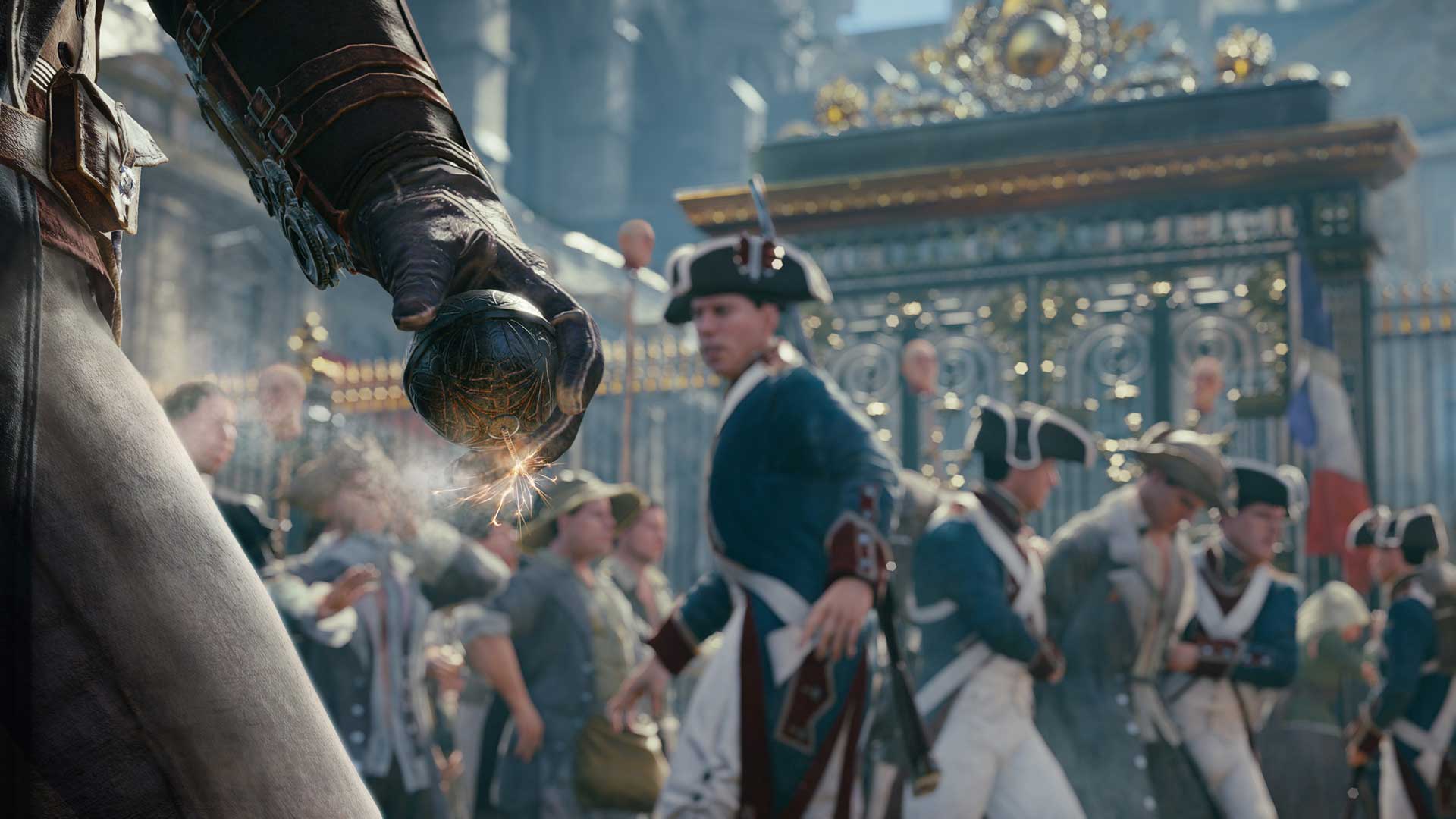
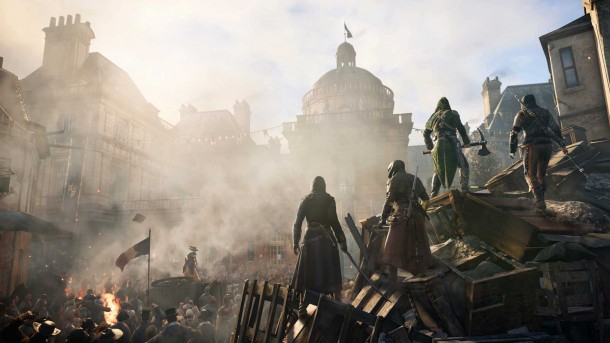
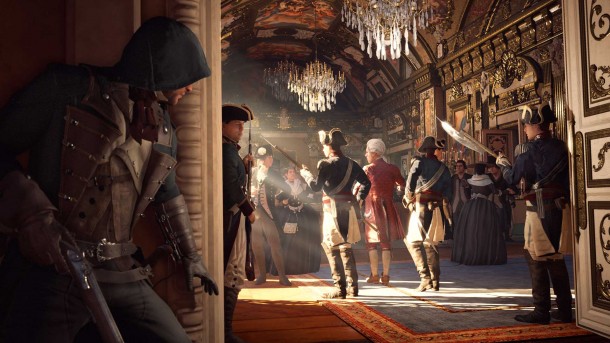
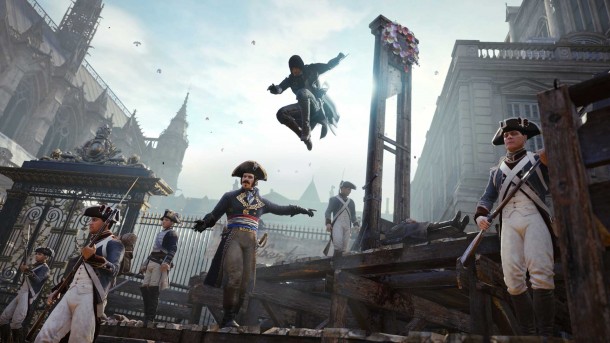
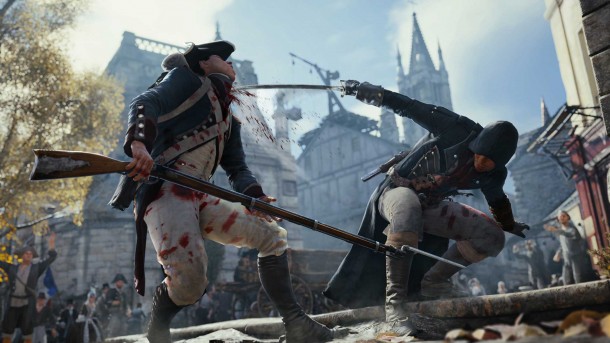
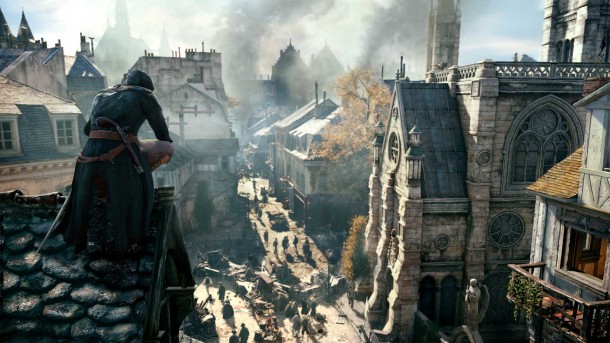

1 Comment